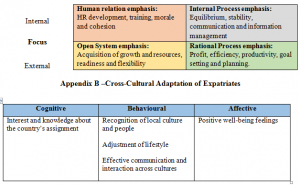Managing and Leading People across Cultural Borders Case Study Solution
Expatriate Preparation:
The only way to use the international HR management involves the preparation of Expatriate which do not primarily consist of ongoing board but is categorized in a series of five steps.
- Starting with process of selection and recruitment to the place where the profile of assignment is stipulated both in internal or external organization.
- Focus on the care of practical and contract preparations such as bonus, leave, taxation, pension, remuneration and support of family.
- Connected preparations including phase out prior jobs by conducting information,recommendations and training.
- Based on description of time required by an individual on abroad missions which includes mentoring and reward, development, appraisal of performance and adjustment.
- Lastly, the preparation of the expatriateincludes pre-program assessment–existing competencies, training – increase in knowledge about the host country,briefing –expansion of skills, repatriation –process to bring expatriate home. (Randhawa, 2007)
Provision of cross-culture training to expatriate reduces the requirement of time for cultural adjustment as well as alleviates the cultural shock severity which might be experienced by an expatriate. CCT by reduction in the duration of stages in the adjustment process which mainly involved a series of four steps: candidate finding, culture shock, experience of expatriate and utilization of capabilities. This reduction significantly assists an expatriate in effective management of operational service with the ability to make managerial decisions. (Avan Jassawalla, 2004)
Crucialability for international career:
With ambition, one of the most crucial ability for successful international career is cultural intelligence – the capability of effective adaptation of new cultural settings which is specifically related to the expatriates.Currently, the literature on expatriates is based on the identification of cross-cultural adjustments mainly in association with the cultural intelligence. A number of managers who have known to be succeeded in local jobs have found that the embracement of mental maps for their entire life does not unavoidably applicable during their overseas shift. For negotiation of cultural borders, expatriates must have the ability to both address and response to the intercultural circumstances in an appropriate manner. Thus, cultural intelligence tends to a skill to provide assistance for improvement in the positive adjustment capacity to the host country’s cultural values. Therefore, the main keys of cultural intelligence includes drive, knowledge, strategy and action. (School, 2015)
Cultural awareness and Decreased impact of stereotyping:
Facilitation of communication through intercultural communication across the barriers of cultures throughout the world. Stereotype is one of the most challenging cultural barrier. Cultural awareness can be raised in individuals with better understanding and know-how of different cultures and their rituals, as well as learning their language. As ability to speak the same language allows you to effectively eliminate the discrimination barrier permitting to better understand the needs and requirements of an individual.
Considering the stereotyping nature as a natural categorization cognitive process, stereotypes are pervasive which undermines the intercultural interaction. For the development of cultural awareness, there is a requirement to address stereotypes by educating the individuals to take a stand against the partiality. (Stephanie Ann Houghton, 2013)
Appendices:
Appendix A – Value model
This is just a sample partical work. Please place the order on the website to get your own originally done case solution.
How We Work?
Just email us your case materials and instructions to order@thecasesolutions.com and confirm your order by making the payment here













